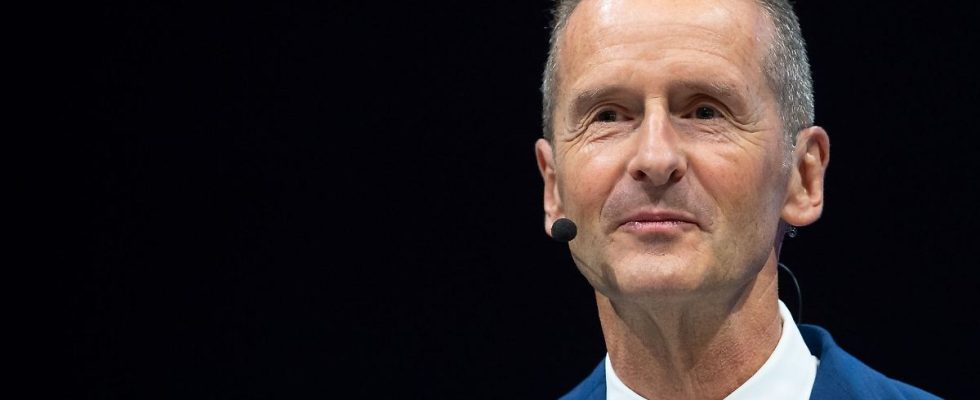Diesel sanctions against VW
Diess: Had no reason to doubt
January 16, 2024, 5:26 p.m
Listen to article
This audio version was artificially generated. More info | Send feedback
Nine years after the diesel scandal at Volkswagen became known, former CEO Diess emphasized in court: He did not believe sanctions because of excessive emissions were possible and always had a “basic trust” in the company – and his predecessor Winterkorn.
In the billion-dollar investor trial against Volkswagen and its main shareholder Porsche SE because of manipulated emissions values, the former CEO Herbert Diess rejected responsibility. Diess told the Higher Regional Court in Braunschweig that he had a “basic trust” that Volkswagen was a good company.
Shortly after he started working, he learned of problems with diesel vehicles in the USA. But until the end he assumed that the problems could be solved. Diess joined Volkswagen as VW brand boss on July 1, 2015. The then CEO Martin Winterkorn conveyed at meetings in the last few weeks before the diesel scandal became known in September 2015 that the Wolfsburg-based car manufacturer was working on a solution together with the US Environmental Protection Agency (EPA), said Diess.
“I had no reason to doubt Winterkorn’s competence,” emphasized the former car manager. “He had the issue in hand.” Until recently, he himself did not believe it was possible that there could be sanctions for excessive emissions. From the beginning he assumed that they would work openly with the authorities. “In my opinion, this is the only sensible approach with authorities,” said Diess. However, the car manufacturer had been hiding something from the authorities for a long time. This was the only way he could explain what came next. The shutdown device itself is not the reason for the EPA’s action – but rather the long duration and the delay.
Scandal triggered numerous lawsuits
After the US Environmental Protection Agency (EPA) reported, the company worked hard to find out whether there had been violations of emissions regulations in other regions and whether many more vehicles could be affected. “The entire board was of course very affected and worried because the dimensions were of such a magnitude that one had to think of a threat to one’s existence,” said Diess.
The 65-year-old said that he himself could not imagine that Volkswagen had violated any laws in Europe, especially since the regulations here are much easier to comply with than in the USA. It was unbelievable to him that there were also deviations in Europe. In 2015, under pressure from the EPA, Volkswagen admitted that it had manipulated diesel emissions values using software. This ensured that the engines met the nitrogen oxide limits on the test bench, but emitted many times more of these toxic exhaust gases on the road.
The scandal triggered a large number of lawsuits. In June 2023, the former head of the Volkswagen subsidiary Audi, Rupert Stadler, was sentenced by the Munich regional court to a suspended sentence and a fine worth millions. For five years, the Braunschweig Higher Regional Court has been negotiating a model lawsuit brought by the Sparkasse fund company Deka Investment due to price losses suffered as a result of the VW emissions scandal.
Compensation has already cost VW 32 billion euros
The plaintiffs – mostly institutional investors – accuse Volkswagen and the defendant Porsche Holding of keeping the information about “Dieselgate” secret for a long time, thereby causing them to lose the value of their shares. Volkswagen counters this by saying that the price relevance only became apparent through the publication of the EPA on September 18, 2015. Compensation for the emissions scandal, primarily fines, damages and legal fees, has so far cost Volkswagen more than 32 billion euros.
The 3rd Civil Senate of the Higher Regional Court, chaired by Christian Jäde, has summoned dozens of witnesses to obtain information about the background to the diesel scandal. These include Diess’ predecessor Matthias Müller and Winterkorn, who resigned after the diesel scandal was exposed in 2015. It is not known whether he is exercising his right to refuse to testify.
At the same time, criminal proceedings are pending against Winterkorn in Braunschweig for emissions manipulation, but these have so far been postponed due to his state of health. The accusation here is commercial fraud. According to his lawyer, Winterkorn rejects the prosecutor’s allegations. In addition, criminal proceedings on suspicion of market manipulation have been reopened.

